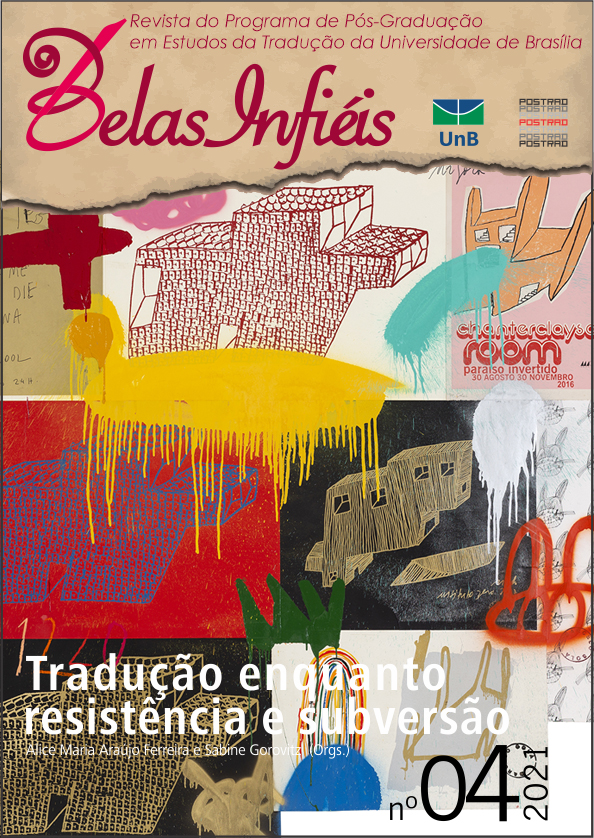Transnacionalismo Desmantelando o Cânon: Uma leitura próxima e distante de várias redes literárias transatlânticas na tradução
DOI:
https://doi.org/10.26512/belasinfieis.v10.n4.2021.36354Palavras-chave:
Transnacionalismo. Tradução literária. Análise de rede. Aleatoriedade. Permuta de traduções.Resumo
Este ensaio argumenta que atos aleatórios de tradução de poesia no contexto transnacional desempenham um papel significativo na transformação de qualquer sistema literário aparentemente homogêneo em uma rede com muitos pontos de acesso. Ao fazer isso, eles minam abertamente ou dissimuladamente a ideia de um cânone literário, uma vez que posicionam, mais ou menos explicitamente, tal cânone contra seu próprio gosto literário e rede de conhecidos. Além disso, a falta de condicionamento financeiro faz com que esse tipo de permutas de tradução chegue mais facilmente ao público literário. Como essas trocas são mais comumente iniciadas por tradutores que trabalham em línguas menos conhecidas, segue-se que as trocas transnacionais de tradução nivelam os desequilíbrios culturais, fazendo com que o trabalho dos tradutores-poetas seja traduzido para línguas de maior circulação. Essa contribuição apresenta quatro tipos de intercâmbios transnacionais no contexto romeno e argumenta que mecanismos de tradução mais complexos resultam em um cenário literário mais aberto, mais diversificado e mais dinâmico, no qual os tradutores desempenham um papel proeminente. De um ponto de vista metodológico, este ensaio combina a tradicional leitura atenta dos textos e paratextos com análise quantitativa e visualização em rede para traçar o plano das traduções romenas de poesia americana e canadense em periódicos entre 2007 e 2017 e quantificar a quantidade de intercâmbios aleatórios em um cenário transnacional.
Downloads
Referências
[References 1 to 5 Omitted for Blind Peer-Reviewing]
BAKER, David. “Margento is a caravan, a circus, a symphony, and a brawl. [Blurb]” In
Margento, Nomadosofia / Nomadosophy, Bistrița: Max Blecher Press, 2014.
BAKER, David. “Introduction.” In Hunger to Hunger. Columbus, OH: Aureole Press, 2012.
Web: http://bit.ly/2zLTnHC.
BALMER, Josephine. Piecing Together the Fragments: Translating Classical Verse, Creating Contemporary Poetry. Oxford: Oxford University Press, 2013.
BRADFORD, Lisa Rose. “The Agency of the Poets and the Impact of Their Translations. Sur, Poesia Buenos Aires, and Diario de Poesia as Aesthetic Arenas for Twentieth-Century Argentine Letters.” In Agents of Translation (John Milton and Paul Bandia, Eds.). Amsterdam, Philadelphia: John Benjamins, 2009, pp. 229-256.
GALVIN, Rachel J. “Poetic Innovation and Appropriative Translation in the Americas.” In A Companion to Translation Studies (Sandra Berman and Catherine Porter, Eds.). Malden, MA:
Blackwell Publishing, 2014, pp. 479-491.
GULEA, Dan. “Scriitorul-muzician.” In LiteraturCo.az, 2010. Web: http://bit.ly/2mDQgN4.
HOLLER, Paul. “An Interview with David Baker.” In Bookslut, 2010. Web: http://bit.ly/2BFydgO.
JACOBS, Adriana X. “The Go-Betweens: Leah Goldberg, Yehuda Amichai, and the Figure of the Poet-Translator.” In The Blackwell Companion to Translation Studies (Sandra Berman and Catherine Porter, Eds.). Malden, MA: Blackwell Publishing, 2014, pp. 479-491.
JONES, Francis R. “Embassy networks. Translating Post-War Bosnian Poetry into English.” In Agents of Translation (John Milton and Paul Bandia, Eds.). Amsterdam, Philadelphia: John Benjamins, 2009, pp. 301-326.
MARAIS, Kobus. Translation Theory and Development Studies. A Complexity Theory Approach. New York: Routledge, 2014.
MÓDICI NÓBREGA, Thelma and Milton, John. “The Role of Haroldo and Augusto de Campos in Bringing Translation to the Fore of Literary Translation in Brazil.” In In Agents of Translation (John Milton and Paul Bandia, Eds.). Amsterdam, Philadelphia: John Benjamins, 2009, pp. 257-278.
MIRONESCU, Doris. “Transatlantic Tanasescu.” In Suplimentul de cultură 383, 2013.
Web: http://bit.ly/2GLoRFS.
NICOLAU, Felix. “For the sake of a liberalized Romanian culture! What about an interdisciplinary and transdisciplinary canon instead of the isolated monopolies with a subscription to the state budget?” In Swedish Journal of Romanian Studies 3(1): 86-103, 2020.
NICOLAU, Felix. “Collaborative and Transnational Translation: MARGENTO.” In Globalization and Intercultural Dialogue. Multidisciplinary Perspectives (Iulian Boldea, Ed.). Târgu-MureÈ™: Arhipelag XXI Press, 2014, pp. 319-329.
OLOȘ, Ana. “Cultural Polyphony in George Elliott Clarke’s Works.” In The Round Table 2 (1), 2012. Web: http://bit.ly/2meAzMk.
OLOȘ. Ana. “Flavia Cosma traduce din George Elliott Clarke.” In Cultura 5, 2007. Web: http://bit.ly/2ECVAZx.
PATRAȘ, Antonio. “Cartea de la Curtea È™i alte 9 topologii (recenzie).” In România literară 37, 2010. Web: http://bit.ly/2jjkBiJ.
PERLOFF, Marjorie. Unoriginal Genius: Poetry by Other Means in the New Century. Chicago, IL: University of Chicago Press, 2010.
POP, Aurel. “George Elliot Clarke: “Poeme incendiare”: traducere de Flavia Cosma.” In Cetatea culturală 5, 2008, pp. 77-78.
SIMON, Sherry. “”A Single Brushstroke”. Writing through Translation: Anne Carson.” In In Translation””Reflections, Refractions, Transformations, Paul St-Pierre, Prafulla C. Kar (Eds.). Amsterdam; New York: John Benjamins, 2007.
ȘTEFÄ‚NESCU, Alex. “George Ciorănescu ”“ un European din România.” In România literară 39, 1999. Web: http://bit.ly/2w32x5E.
TANASESCU, Chris. “Notă aspura autorului È™i traducerii.” In Mistici, hoÈ›i È™i nebuni
(Jerome Rothenberg, Author; Chris Tanasescu and Raluca Tanasescu, Trad.). Bistrița: Max Blecher Press, 2013, pp. 184-186.
TANASESCU, Chris. The Graph Poem (Four Poems & a Note on the Poetics). In Poems and Poetics, March 6, 2011. Web: http://bit.ly/2B51M9w.
WELSH, Jim. “A Poet among Us Most Clearly Revealed. Selected Poems by Michael Waters.” In Alecart 10, 2013, pp. 38-39.
WOODSIDE, Martin. “Martin Woodside reviews MARGENTO's Nomadosofia / Nomadosophy.” In Asymptote, 2014. Web: http://bit.ly/2JrQ8ek.
Downloads
Publicado
Como Citar
Edição
Seção
Licença
Copyright (c) 2021 CC BY

Este trabalho está licenciado sob uma licença Creative Commons Attribution 4.0 International License.
Dado ao acesso público desta revista, os textos são de uso gratuito, com obrigatoriedade de reconhecimento da autoria original e da publicação inicial nesta revista
A revista permitirá o uso dos trabalhos publicados para fins não comerciais, incluindo direito de enviar o trabalho para bases de dados de acesso público. As contribuições publicadas são de total e exclusiva responsabilidade dos autores.
Os autores, ao submeterem trabalhos para serem avaliados pela revista Belas Infiéis, mantêm os direitos autorais e concedem à revista o direito de primeira publicação, sendo o trabalho licenciado sob a Creative Commons Attribution License Atribuição 4.0 Internacional (CC BY 4.0).



















